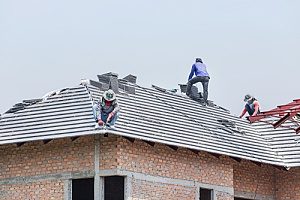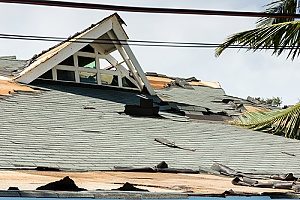 Roof replacement can be a costly investment. To mitigate the expense, many homeowners rely on their insurance company to help cover all or part of the bill. Unfortunately, the roof replacement insurance claim process can be lengthy and complex. Before going forward with your claim, it’s important to understand what your homeowner’s policy covers in terms of roof damage. It’s also wise to have your property inspected by roof replacement contractors to prove the extent of the damage to your insurance company. Here’s a look at some common insurance roof replacement questions.
Roof replacement can be a costly investment. To mitigate the expense, many homeowners rely on their insurance company to help cover all or part of the bill. Unfortunately, the roof replacement insurance claim process can be lengthy and complex. Before going forward with your claim, it’s important to understand what your homeowner’s policy covers in terms of roof damage. It’s also wise to have your property inspected by roof replacement contractors to prove the extent of the damage to your insurance company. Here’s a look at some common insurance roof replacement questions.
1. What Do Insurance Adjusters Look for On Roofs?
When you contact your insurance company about a roof replacement claim, they will generally send an inspector or adjuster to determine the extent of the damage. To be eligible for roof replacement coverage, your roof will usually need to show signs of prominent hail damage or other significant weather-related damage. When exposed to hazardous weather conditions, your roof may exhibit red flags like accelerated shingle and granule loss. The inspector may look for other obvious signs of damage, such as curling or cracked shingles, exposed underlayment, or dark streaks that indicate algae growth.
2. Do I Need To Tarp My Damaged Roof?
You may be thinking, “What is the point in covering my roof if it’s already damaged?” The truth is, most insurance companies require homeowners to take any necessary steps to prevent further damage to their roof and subsequently the interior of their home. Failure to do so could result in more substantial damage, especially if your area is expected to receive heavy rainfall in the upcoming days or weeks. If you do not tarp your roof and the damage worsens, you risk losing your chance to collect a settlement.
3. Will My Rates Increase if I File a Roof Replacement Claim?
 Many homeowners are under the misconception that their homeowner’s insurance rates will increase if they file a claim. This isn’t true. Homeowners insurance does not work in the same way as auto insurance and you will not be penalized if you file a roof replacement claim. There are some scenarios that may result in a rate increase, such as if your area has sustained heavy storm damage. However, this type of rate increase is not related to you filing a claim for a roof replacement.
Many homeowners are under the misconception that their homeowner’s insurance rates will increase if they file a claim. This isn’t true. Homeowners insurance does not work in the same way as auto insurance and you will not be penalized if you file a roof replacement claim. There are some scenarios that may result in a rate increase, such as if your area has sustained heavy storm damage. However, this type of rate increase is not related to you filing a claim for a roof replacement.
4. What Is the Standard Insurance Company Payment Process?
Just because you have homeowners insurance does not necessarily mean you will receive reimbursement for the total cost of your roof replacement. There are two main types of insurance policies that work in different ways. Under an actual cash value policy, your roof depreciates in value annually for a period of ten years. If your roof sustains damage in that time, you will receive a check for the depreciated value. If you have a replacement cost policy, the insurance carrier will cover the total roof replacement cost. However, the homeowner is responsible for any deductible.
5. Can I Get a Second Opinion About My Claim?
Roof replacement claims are sometimes denied by the insurance company for a wide range of reasons. While sometimes the reason for the denial is verifiable, other times, a denial is made when the claim adjuster did not do his or her job properly or hurried through the process. When this happens, you have the right to a second opinion. If you choose, you can hire a public adjuster to look over your roof and make a statement. This is a great way to get the coverage you need and avoid claim adjusters who deny or underpay on roof damage claims.
6. Why Do Insurance Companies Withhold Depreciation?
 You may find that your insurance company has withheld depreciation. This can occur for several reasons. First, the insurance company wants to ensure that you’re actually going to get the roof replacement done. If they provide the money upfront, you may fail to get the damage fixed and spend the money elsewhere. Second, the insurance company only wants to pay out the specific amount you need to replace your roof. By withholding funds, they’re able to adjust the amount paid based on the final invoice.
You may find that your insurance company has withheld depreciation. This can occur for several reasons. First, the insurance company wants to ensure that you’re actually going to get the roof replacement done. If they provide the money upfront, you may fail to get the damage fixed and spend the money elsewhere. Second, the insurance company only wants to pay out the specific amount you need to replace your roof. By withholding funds, they’re able to adjust the amount paid based on the final invoice.
7. Do I Need To Get Several Estimates?
While you may be tempted to seek estimates from different roof replacement contractors in your area, this isn’t always necessary. When your insurance company provides coverage for the work, you simply have to make sure that the contractor is going to charge you equal to or less than the estimate produced by the insurance company. The insurance company will only pay for the actual repairs, regardless of how much the contractor charges. This amount is referred to as the “fair market price” and is based on your location and industry standards.
8. Can I File an Insurance Claim for Fire or Animal Damage?
In many cases, the answer to this question is yes you can. However, it depends on your homeowners policy and what exactly it covers. Be sure to read the fine print on your policy. Many policies state that if your roof has surpassed a certain age, such as 20 years, then the roof is considered to be past its life expectancy. When this happens, the insurance company may only pay the depreciated value or nothing at all. If it is found that you did not properly maintain your roof over time, your claim may also be denied.
Learn More About Roof Replacement
If you plan on filing a roof replacement claim or are in the midst of a claim, you may have questions that have not been answered by your insurance company. Without a solid understanding of how the roof replacement claim process works, you may be confused about what type of damage is covered and how much coverage you are entitled to. An experienced contractor can help navigate you through the process and provide the roof replacement services you need.
If you have any insurance roof replacement questions, or want to learn more about roof replacement, contact the Northern Virginia roof replacement contractors at Beyond Exteriors.